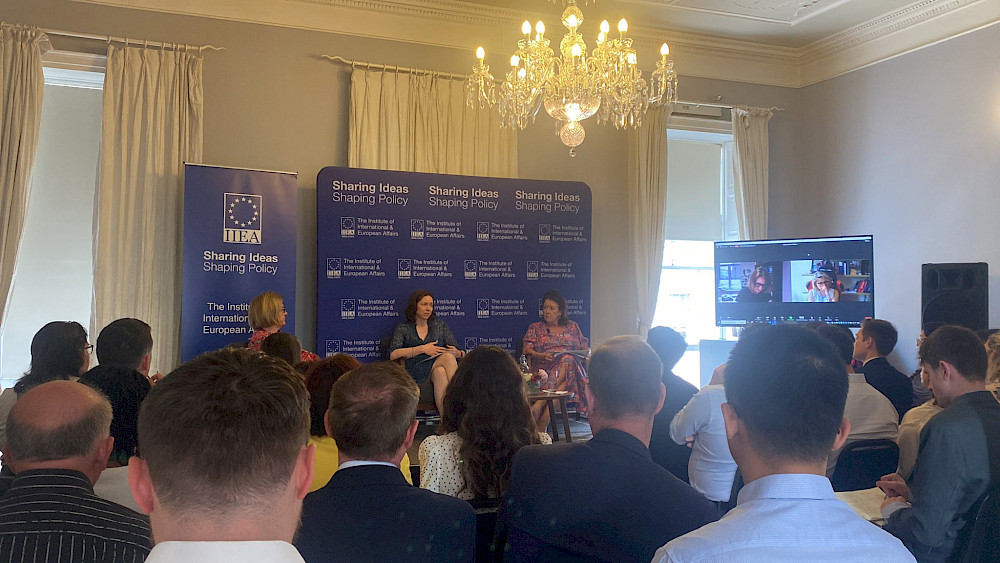FuJo Deputy Director Dr Eileen Culloty spoke at an IIEA event on the European Media Freedom Act. The event ‘Safeguarding Media Pluralism and Independence in the Digital Age: Ireland in Context’ was organised by the IIEA in collaboration with the Economic Regulators Network
Eileen was joined on the panel by Anna Herold, Head of the Audiovisual and Media Policy Unit in DG CONNECT; Renate Schroeder, Director of the European Federation of Journalists; and Celene Craig, Commissioner at the Media Commission of Ireland.

Below is a copy of Eileen's opening remarks:
Many thanks to the IIEA for the invitation. At the DCU FuJo Institute, my colleagues and I work on a number of projects investigating the changing media landscape and its implications for democracy. For example, we are the Irish representatives for the Media Pluralism Monitor; the Media Ownership Monitor; the Local Media for Democracy Monitor; the European Digital Media Observatory; and the Reuters Digital News Report, among other projects.
One of the interesting things about these particular projects is that they all put Ireland in a comparative context. And within that comparative context, the media situation here is generally favourable. For example, the Reuters Digital News Report, which was published yesterday, found that Irish people have more trust in news than the EU average. Last year, the Media Pluralism Monitor ranked Ireland ninth lowest in its assessment of media pluralism risks across 32 countries. To be clear, there are challenges and concerns in Ireland, but those issues are more far pronounced elsewhere.
Sometimes that comparative framework is helpful for giving us perspective, but there is also a danger that we become complacent and take things for granted. For example, in the Media Pluralism Monitor report, my colleague Dr Roddy Flynn (2022:8) writes: “though professional journalistic norms generally ensure editorial content is not shaped by commercial or owner influence, the absence of overt rules requiring this remains a concern”. In other words, editorial independence is dependent on professional norms, but there’s no legal framework to require or protect editorial independence.
In many ways, the lack of recognition and protection for editorial independence and related media freedom issues is very surprising. Those of us who are involved with media - whether as media workers, teachers, researchers, or regulators - constantly reference the democratic role of the "fourth estate" that "holds power to account". Yet, that role has not been buttressed with robust legal guarantees.
That’s why the European Media Freedom Act is necessary. It will finally give recognition and protection to the media as a pillar of democracy by attempting to “guarantee that editors and journalists can work without interference”. In doing so, it can disrupt the playbook for media capture in countries that are backsliding into illiberalism. And it can also address complacent, “above average”, countries, such as Ireland, by forcing them to take the democratic role of media seriously.
So overall, the Media Freedom Act is very welcome and will sit alongside other important developments at EU level including the Digital Services Act, the Anti-SLAPP Directive, and the Recommendation on the Safety of Journalists. That said, there are a few additional observations I would like to make about the Act, specific challenges for Ireland, and the wider media challenges.
Defining public interest media: In our digital media landscape, I think it is essential to define public interest media. The Act refers to “media services providers”, but that is a very broad term. When you consider that the barriers to becoming a media producer or establishing a media outlet have never been lower, it would be helpful to distinguish public interest media from media services generally. Consider, for example, the rise of opinion-driven websites that present themselves as news or social media accounts that claim to be doing “citizen journalism”. The Act also refers to “professional” content - as opposed to user-generated content - but the boundaries of what is and isn’t professional can be hard to draw with contemporary media.
In my view, this definitional issue is at the heart of the lobbying tensions that surround the Act and troubled the DSA before it. What needs to be protected is public interest media not the publishing industry. Moreover, as many others have pointed out, the kind of exemptions or privileges the publishing industry seeks for itself are contrary to efforts to reduce the influence of disinformation and low-quality content.
Funding for public service media: The Act has specific provisions to ensure the editorial independence of public service media. These provisions specifically target countries where public service media have been captured by political interests. In Ireland, in contrast, public service media have largely been abandoned by politics. Governments have repeatedly ignored RTÉ’s pleas for licence-fee reform and the current government even rejected the main recommendation of its Future of Media Commission, which called for a new public funding model. Against that history of neglect, Article 18 of the EMFA states it is “necessary to guarantee that … public service media providers benefit from sufficient and stable funding to fulfil their mission”. Incidentally, some studies indicate that strong public service media is a good indicator of resilience to disinformation and related issues (Humprecht et al. 2020).
Defamation and SLAPPS: The threat of defamation in Ireland has been criticised for its potentially chilling effect on media freedom and media pluralism. In March this year, journalist Naomi O’Leary compiled a report on this for the International Press Institute. She wrote: “legal intimidation affects the full range of Irish media, from the smallest shoestring podcasts and magazines to major broadcasters”. Her interviewees revealed that the threat of defamation muzzled reporting about topics such as the housing crisis, concussion in sport, sexual abuse, and day-to-day political reporting.
There is clearly urgency around this issue and defamation law is being reformed. It’s worth noting that the European Anti-SLAPP Directive targets cross border cases only so Irish media and journalists are relying on national defamation reform to give them protection.
Finances: This is a more general and perhaps more pessimistic because it’s about the big question that hasn’t been resolved: how can public interest media become financially sustainable? We inherited a commercial media system in which public interest news was profitable because (i) media sources were scare; (ii) they could command high advertising revenues; and (iii) and they could offset the cost of investigative work against the revenue coming in from other areas. That system is gone. We cannot assume that the logic of commercial media will continue to produce public interest journalism.
Imagine a scenario where there is a diversity of private outlets in a country and full transparency about ownership and financing, but the democratic quality of the news is very low because commercial pressures don’t incentivise public interest investigations.
And, coming full circle, that’s why I think a definition of public interest media is essential because media pluralism, editorial independence, and media freedom are not ends-in-themselves. They are valuable because they are foundations for public interest journalism and accountability.


